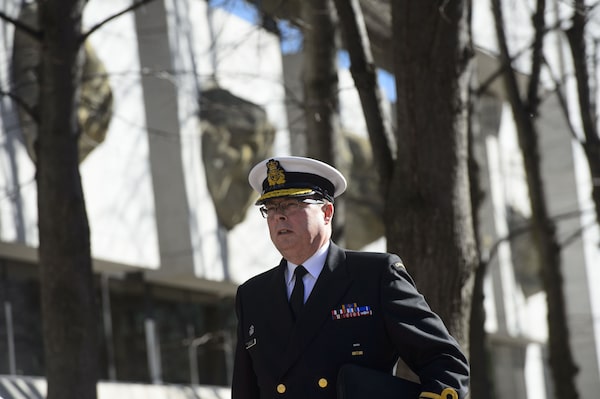
Vice-Admiral Mark Norman arrives at court in Ottawa on April 19, 2019.Sean Kilpatrick/The Canadian Press
The Crown is set to drop the charge of breach of trust against Vice-Admiral Mark Norman, putting an end to the politically charged prosecution of the suspended military officer.
The Public Prosecution Service of Canada informed reporters on Tuesday evening that they “may wish to attend” a hearing related to the matter on Wednesday at 10 a.m., a highly unusual procedure in the case that is at the pretrial stage.
The Globe and Mail has confirmed that prosecutors are expected to drop the charge, which was related to an allegation that Vice-Adm. Norman had leaked confidential information linked to a shipbuilding contract awarded by the previous, Conservative government in 2015.
The trial was expected to get under way just before the start of the election campaign at the end of the summer. The trial would have likely featured potentially damaging evidence and testimony for the Liberal government. After coming to power in October, 2015, the Liberal cabinet temporarily put the contract with the Davie shipyard in Quebec on hold.
Vice-Adm. Norman’s defence team has struggled through a series of pretrial motions to obtain access to classified documents from the government, sparking accusations in the House of Commons that the Liberals were hiding key information related to the case.
Combined with the SNC-Lavalin affair, the Liberals have faced a series of attacks for their handling of politically sensitive cases before the courts. In both cases, the investigations were carried out by the RCMP, which has had a checkered record in recent years of securing convictions for white-collar crimes and politically sensitive cases.
Vice-Adm. Norman was suspended as the military’s second-in-command on Jan. 16, 2017, and charged last year over allegedly leaking government secrets in an attempt to influence cabinet’s decision on a $700-million shipbuilding contract with Quebec’s Davie shipyard. He has denied any wrongdoing.
The defence team has been trying for months to obtain thousands of government documents and internal communications related to the charge against Vice-Adm. Norman, some of which, the defence has said, will exonerate their client.
His defence team has also alleged political interference in the case, previously raising Prime Minister Justin Trudeau’s comments – which he made before Vice-Adm. Norman was charged – that the case would end up in court.
The court heard Chief of Defence Staff General Jonathan Vance say that he did not take notes when he met with top officials in the Prime Minister’s Office and spoke by phone with Mr. Trudeau after learning that Vice-Adm. Norman was under criminal investigation.
From the archives: Mark Norman’s trial exposes the continuing culture clash in Canada’s military
From the archives: Mark Norman case highlights a broken procurement system
Later the court heard Vice-Adm. Norman’s defence lawyer Marie Henein threaten to seek subpoenas for the Prime Minister’s former principal secretary Gerald Butts and Clerk of the Privy Council Michael Wernick to testify in court if they fail to produce the very documents they had requested in October.
In late March, Ms. Henein said that Mr. Wernick provided to the defence a “completely redacted” 60-page memo he wrote to the Prime Minister last fall related to the breach-of-trust charge against the senior naval officer.
The redacted document prompted an argument between the defence and government lawyers over when it is appropriate for the government to claim solicitor-client privilege. Justice Heather Perkins-McVey interjected that day, saying, “Michael Wernick is not a lawyer, I don’t believe.”
Most recently, the defence pointed to Mr. Wernick’s words during his SNC-Lavalin testimony in their argument over access to documents where the government has claimed privilege. The defence argued that by voluntarily commenting on a decision he made regarding the Norman matter during a parliamentary committee, he waived privilege on the documents by speaking publicly about the basis of his decision.
One of the pretrial hearings heard the defence team allege that Crown prosecutors discussed trial strategy with the Privy Council Office, which the Public Prosecution Service of Canada denied.
The pretrial hearings also saw the defence team take aim at the Department of Justice, accusing the department of tweeting inaccurate information about the court’s proceedings.